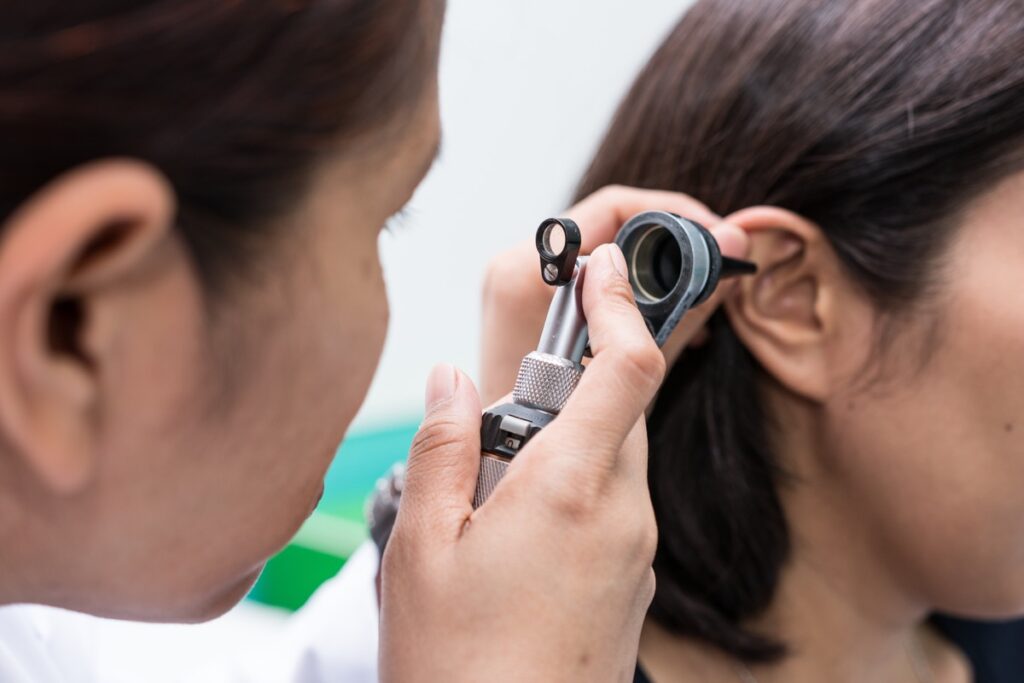What is Auditory Processing Disorder?
Auditory processing disorder is a condition that makes it challenging for the brain to interpret sounds. Commonly referred to as central auditory processing disorder, individuals living with the condition don’t have issues with their normal hearing or abilities. However, they have challenges making sense of the sound once it has entered the brain through the auditory nerve.
Individuals living with auditory processing disorder often experience frustration, confusion, and disorientation. This is because they find it challenging to connect with others in specific social interactions – especially if they are in a crowded space.
Although living with auditory processing disorder (APD) can be challenging, many available resources and programs can help individuals improve their auditory processing abilities and skills.
What’s more, understanding APD, its symptoms, and treatment options can help families or caregivers provide the proper support that can help boost improvement.
Auditory Processing Disorder Symptoms
Children diagnosed with auditory processing disorder usually show signs of the condition from an early age. Parents can notice challenges with everyday communication; however, it is often confused with other conditions.
Some common symptoms of central auditory processing disorder include:
- Challenges with understanding speech (especially in noisy environments with background noise)
- Challenges with staying focused during conversations or similar activities
- Challenges and visible frustration while attending long lectures or activities that require listening
- Challenges with reading, writing, or spelling
- Challenges with telling apart similar sounds (auditory discrimination)
- Frequently misunderstanding what is being said
- Challenges with following step-by-step directions
- Challenges learning music
It’s important to note that not all individuals with auditory processing disorder will experience all the symptoms listed above. Every person has a unique set of needs and requires personalised support action steps.
Auditory Processing Disorder in Adults
Many individuals have found ways to cope with the symptoms of APD during their childhood and adolescence and are living undiagnosed with the condition as adults.
However, adults with the condition might have challenges at work, during social situations, and in other everyday activities. This can be stressful and significantly impact the mental health and confidence of anyone going through it.
Diagnosing auditory processing disorder in adults isn’t uncommon, and many action steps can be taken to help improve the condition’s symptoms.
Challenges at Home for Adults with APD

Adults might experience auditory processing difficulties with their families and peers at home. Some of those challenges include the following:
- Communication – because adults with APD have challenges processing sounds, it can be frustrating while interacting with family members or close acquaintances. Additionally, misunderstandings and misinterpretations can commonly occur due to auditory perception challenges
- Auditory hypersensitivity – in some situations, it might be difficult for adults to be in noisy environments in their homes. This means they might have difficulties tolerating loud appliances such as blenders or vacuums
Challenges at Work for Adults with APD
Adults might find it most challenging to function in a work environment. This is mainly because work requires a constant focus that relies heavily on communication and verbal instructions. However, when an adult experiences difficulty understanding speech, it can often become frustrating and discouraging.
Some of the main challenges for adults with central auditory processing disorder at work include:
- Following instructions – because APD can make it challenging for adults to understand speech, following step-by-step instructions can sometimes be more complex when APD is present. Auditory memory might also be affected, making it difficult for individuals to follow instructions
- Time management and organisation – APD can make it challenging to stay on top of tasks, appointments and similar responsibilities, including planning and time management
Despite these challenges, it’s essential to note that everyone experiences symptoms of different severity. Additionally, diagnosed adults can perform at work without challenges, especially if they have the proper support and resources.
Challenges in Everyday Tasks for Adults with APD
Auditory processing disorders can affect adults in their everyday tasks as well. Finishing household and personal chores can be challenging, depending on the symptoms. Additionally, it might be challenging for adults to participate in social interactions in noisy environments or places with loud background noise.
Types of Auditory Processing Disorders
To better understand the condition and how it can affect auditory processing skills, it’s crucial to learn more about the different types of auditory processing disorders.
Each type has unique symptoms and characteristics that can influence how an individual processes auditory information. Some individuals might experience more than one type of central auditory processing disorder.
Auditory Hypersensitivity
When individuals with APD have challenges understanding spoken language and processing auditory information, especially in loud environments, it most commonly is auditory hypersensitivity. This can cause physical and emotional reactions to sounds.
Specific sounds, such as loud appliances or white noise, might be distressing and even deafening to individuals with this type of APD.
Phonetic Decoding
This type of APD makes it challenging for individuals to decode the meaning of the sounds they hear. So, individuals have no difficulties absorbing auditory information, but once it gets to their central nervous system, making sense of it is challenging.
Integration
Individuals experiencing auditory integration might find it challenging to do multiple things simultaneously while listening. This type of central auditory processing disorder can be easily spotted in school environments where students often have to take notes while listening to lectures.
Prosodic
The prosodic type affects how individuals process tone, implied meaning, or inflexion. So, it might be challenging to understand speech elements such as questions or exclamations. Individuals might often misinterpret the speaker’s mood and talk in a monotone voice.
Organisational Deficit
With the organisational deficit, there’s a problem processing sounds in a specific order, especially in environments with loud background noise. Hence, essential components of a message can get lost.
Causes of Auditory Processing Disorder
It’s still unclear what exactly causes auditory processing disorders. However, professionals have a few potential hypotheses on what causes the condition.
Acquired APD
APD can appear during or shortly after birth and in the first year of infancy. Some of the causes include:
- Lack of oxygen to the brain during or shortly after birth
- Recurring ear infections or chronic ear infections
- Head injury acquired during or shortly after birth
- Neurological damage caused by degenerative diseases
Developmental APD
APD can occur during the development of the central auditory system, and some professionals think it might relate to genetics.
Although there’s no clear indication of what causes APD, many treatment options and programs can help minimise the symptoms in specific cases.
Learning Difficulties with APD
It’s crucial to remember that auditory processing disorder does not affect intellect in any way. However, children might have challenges in school caused by APD.
Following instructions, staying focused, and understanding what is being said during class are the most common challenges of APD. What’s more, school settings tend to be loud, and this might pose an additional challenge to children experiencing APD.
Challenges with auditory processing skills can make it difficult for children to develop communication skills, vocabulary, and spelling skills.

APD and Other Conditions
In many cases, APD’s symptoms can overlap with another condition, learning disability, or difficulty. However, in other cases, an individual might experience both APD and a specific learning disability. That’s why it’s essential to understand their correlation and symptoms.
Auditory Processing Disorder and Dyslexia
Dyslexia is a language-based learning difficulty that affects the speed or accuracy of reading, spelling, and writing. So, when an individual has challenges with reading, for example, it might be because of symptoms inflicted by either APD or dyslexia.
Proper diagnosis is crucial because, in some cases, individuals with dyslexia also experience APD but are unaware. This can impose additional challenges during treatment, causing further frustration and a lack of self-confidence.
Auditory Processing Disorder and ADHD
Although both auditory processing disorder and ADHD overlap in some characteristics, individuals with APD often have challenges with listening skills and frequent need for clarification, while individuals with ADHD have challenges with staying attentive and are hyperactive.
Additionally, individuals experiencing attention deficit hyperactivity disorder tend to have challenges with inattention and hyperactivity in most environments, while individuals with APD find it challenging to pay attention in loud environments.
Auditory Processing Disorder and Autism Spectrum Disorder
Autism Spectrum Disorder and APD can overlap. Auditory hypersensitivity is a common occurrence in individuals on the Autism spectrum.
Additionally, it is quite common for individuals living with Autism to experience challenges in making sense of speech while in loud environments.
Managing Auditory Processing Disorder
Individuals diagnosed with APD can manage the symptoms and live life to the fullest potential with the proper treatment tailored to their specific needs.
There are many programs and plans that can help individuals learn how to process sounds better. Auditory training is key in APD treatment, and it can help individuals with the following:
- Overcome challenges when identifying sounds
- Overcome challenges to determine a sound location
- Overcome auditory processing problems in loud environments
Aside from auditory training, some individuals might benefit from speech therapy and work with a dedicated speech-language pathologist. Making changes to an individual’s environment can also help by making the environment less noisy and avoiding background noise.
It’s crucial for the treatment process to be tailored to each individual. With proper plans and action steps, individuals with APD can improve their auditory processing skills and live more independently.
Support and Assistance for People with APD
There’s an extensive list of things anyone can do to help support individuals with an auditory processing disorder as a non-professional. Some of the main things include:
- Being mindful of your speaking pace
- Speak face to face
- Making sure the room is quieter by reducing background noise
- Be patient, repeat and rephrase if needed
- Use visual aids if needed
- Being respectful while showing your support
Support from Leaf Complex Care for People with APD
At Leaf Complex Care, we celebrate the differences of individuals and focus on their potential and raising the overall quality of their lives.
Our mission is to provide proactive and expert care for individuals with complex care needs. We create a safe space for people with APD, helping them focus on their strengths and overcome their challenges.
We are aware that each person is unique, and every individual requires a tailor-made support plan. So, that’s exactly what we provide.
We offer support during school hours, and our clinicians can assist with academic tasks and homework. Our goal is to deliver the right and most fitting complex care package.

